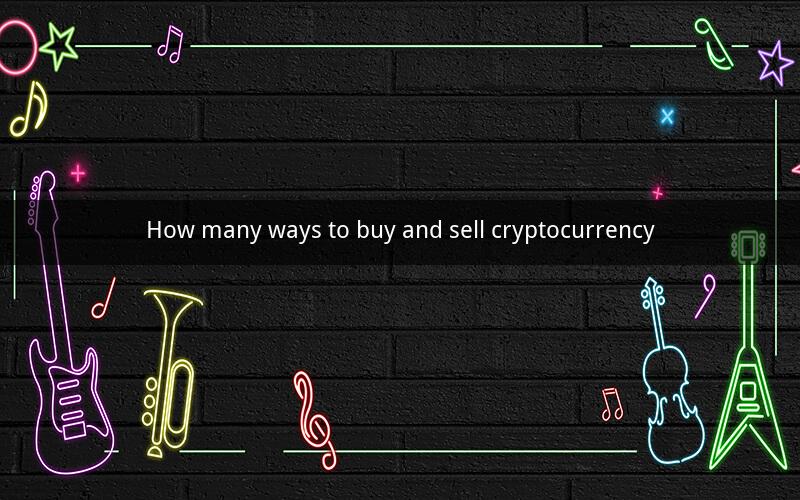
How Many Ways to Buy and Sell Cryptocurrency: A Comprehensive Guide
Table of Contents
1. Introduction to Cryptocurrency Trading
2. Direct Exchange Platforms
3. Cryptocurrency Brokers
4. Peer-to-Peer Trading
5. Mobile Apps for Cryptocurrency Trading
6. Online Exchanges and Marketplaces
7. Cryptocurrency ATMs
8. Cryptocurrency Exchanges with Margin Trading
9. Cryptocurrency Derivatives and Futures Trading
10. Leveraged Trading Platforms
11. Conclusion
1. Introduction to Cryptocurrency Trading
Cryptocurrency trading has become increasingly popular as digital currencies like Bitcoin, Ethereum, and Litecoin gain widespread acceptance. With the rise of blockchain technology, more people are looking to invest in and trade cryptocurrencies. However, with so many ways to buy and sell cryptocurrency, it can be overwhelming to decide which method is best for you. This guide will explore the various options available for trading digital currencies.
2. Direct Exchange Platforms
One of the most straightforward ways to buy and sell cryptocurrency is through direct exchange platforms. These platforms connect buyers and sellers, allowing them to trade cryptocurrencies directly with each other. Some well-known direct exchange platforms include LocalBitcoins, Kraken, and Bitstamp.
3. Cryptocurrency Brokers
Cryptocurrency brokers act as intermediaries between buyers and sellers. They offer a range of services, including market analysis, trading advice, and access to a variety of digital currencies. Examples of popular cryptocurrency brokers include Coinbase, eToro, and Bitfinex.
4. Peer-to-Peer Trading
Peer-to-peer (P2P) trading involves individuals buying and selling cryptocurrency directly from one another. P2P platforms like Paxful and Binance P2P facilitate these transactions, offering a decentralized and often more private way to trade digital currencies.
5. Mobile Apps for Cryptocurrency Trading
Mobile apps have made it easier than ever to trade cryptocurrency on the go. Many exchanges and brokers offer mobile apps that provide access to their trading platforms, allowing users to buy, sell, and manage their cryptocurrency investments from their smartphones or tablets.
6. Online Exchanges and Marketplaces
Online exchanges and marketplaces are among the most popular ways to buy and sell cryptocurrency. These platforms provide a centralized marketplace where users can trade digital currencies against fiat currencies or other cryptocurrencies. Some of the largest online exchanges include Binance, Coinbase Pro, and Kraken.
7. Cryptocurrency ATMs
Cryptocurrency ATMs offer a convenient way to buy and sell digital currencies without the need for an internet connection. These ATMs allow users to exchange fiat currency for cryptocurrency or vice versa. However, it's important to note that fees and the availability of ATMs can vary widely.
8. Cryptocurrency Exchanges with Margin Trading
Margin trading allows users to borrow capital from the exchange to increase their trading position. This can amplify gains but also increase risk. Exchanges that offer margin trading include Bitfinex, Binance, and BitMEX.
9. Cryptocurrency Derivatives and Futures Trading
Derivatives and futures trading involve trading contracts based on the value of a cryptocurrency. These contracts can be bought and sold on specialized exchanges like BitMEX, Binance Futures, and OKEx.
10. Leveraged Trading Platforms
Leveraged trading platforms allow users to trade with borrowed capital, which can amplify profits but also increase losses. These platforms often offer trading of cryptocurrency against fiat currencies or other cryptocurrencies. Examples include Bybit and Huobi.
Conclusion
Trading cryptocurrency can be done in various ways, each with its own set of advantages and disadvantages. Whether you prefer the simplicity of direct exchange platforms, the convenience of mobile apps, or the leverage offered by margin trading, there is a method that can suit your needs. It's important to research and understand each option before deciding how to buy and sell your digital currencies.
---
FAQs and Answers
1. What is the difference between a cryptocurrency exchange and a broker?
- Cryptocurrency exchanges facilitate direct trading between buyers and sellers, while brokers act as intermediaries and may offer additional services like market analysis and trading advice.
2. Is it safe to buy cryptocurrency through a mobile app?
- Mobile apps can be safe, but it's important to choose reputable platforms and to take necessary precautions, such as using strong passwords and enabling two-factor authentication.
3. Can I trade cryptocurrency without a bank account?
- Yes, many cryptocurrency exchanges and P2P platforms allow you to trade without a bank account, often using payment methods like credit/debit cards or digital wallets.
4. What is the best way to store my cryptocurrency?
- The best way to store cryptocurrency depends on your needs. Hot wallets are convenient for day-to-day transactions, while cold wallets, such as hardware wallets, are more secure for long-term storage.
5. How do I know if a cryptocurrency exchange is legitimate?
- Look for exchanges with good reviews, a strong track record, and proper licensing. Also, check if they have been subject to any security breaches or regulatory actions.
6. What are the fees associated with trading cryptocurrency?
- Fees can vary depending on the platform, the type of trade, and the payment method used. Be sure to research the fees before you start trading.
7. Can I trade cryptocurrency on a regular stock exchange?
- No, regular stock exchanges do not trade cryptocurrencies. Cryptocurrency trading is typically done on specialized exchanges and platforms.
8. What is the best cryptocurrency to invest in?
- There is no one-size-fits-all answer. It's important to research different cryptocurrencies and consider factors like market cap, liquidity, and your investment goals.
9. How do I avoid getting scammed when buying cryptocurrency?
- Be cautious of unsolicited offers, do thorough research on the credibility of the platform or individual, and never share your private keys or personal information.
10. Can I trade cryptocurrency 24/7?
- Yes, cryptocurrency markets operate 24/7, allowing traders to buy and sell at any time, although it's important to be aware of potential market volatility during off-peak hours.